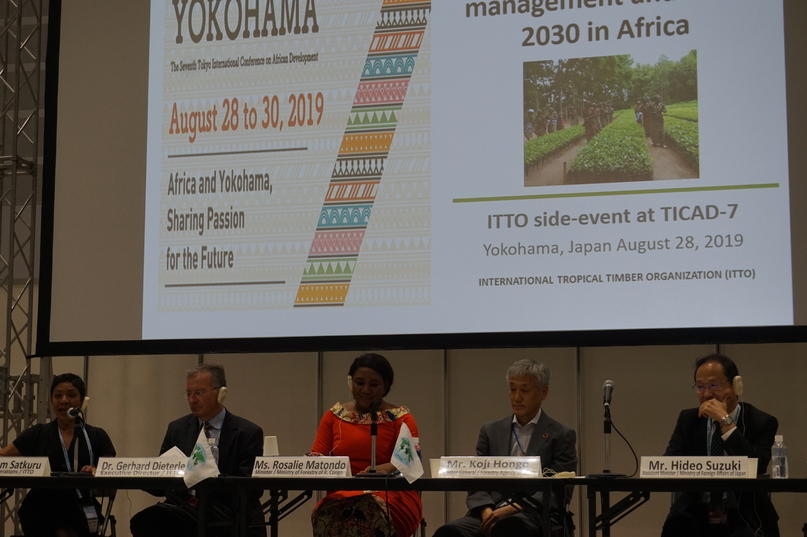Legal, sustainable tropical forest supply chains and landscape restoration can help achieve SDGs in Africa, says panel
2 September 2019, Yokohama, Japan

The podium of the ITTO side-event at TICAD 7. Photo: R. Carrillo
Africa’s diverse forests play essential roles in livelihoods and economic development by producing a wide range of goods and environmental services. Sustainable forest management (SFM) has the potential to increase the contributions of tropical forests to the SDGs by, for example, mitigating climate change, hosting terrestrial biodiversity, producing food and biomass energy, safeguarding water quality and supporting economic development in rural areas.
The side-event, which was held on 28 August 2019, was co-organized by ITTO, Japan’s Forestry Agency and the Japan International Cooperation Agency (JICA), with the support of Japan’s Ministry of Foreign Affairs, the City of Yokohama and Kanagawa Prefecture.
In his opening address, the ITTO Executive Director, Dr Gerhard Dieterle, noted that Africa’s population is projected to increase from 1.2 billion people today to 4.4 billion by the end of the century, putting more pressure on forests to supply needed products and environmental services. Therefore, he said, “we must focus more on the role and use of productive forests before it is too late”. Crucial to this, said Dr Dieterle, was the creation of legal and sustainable or “green” supply chains for forest products to ensure that producers receive appropriate remuneration for these products and thereby better enable them to support productive forests and contribute to the restoration of degraded forests. Dr Dieterle spoke about ITTO’s initiative, Legal and Sustainable Supply Chains for Tropical Wood and Forest Products, which emphasizes the integration of supply chains and markets.
Mme Rosalie Matondo, the Congo’s Minister of Forest Economy and Ambassador for the Brazzaville Roadmap on Community-based Forestry in Central Africa, advocated the adoption of a more effective community-based and participatory system for the sustainable management of forest resources in the context of the 2030 Sustainable Development Agenda. [Read more about Mme Matondo’s address here.]
Mr Hongo Koji, Director General of Japan’s Forestry Agency, noted that, like Japan, many countries in Africa are being affected by natural disasters exacerbated by climate change, such as flooding, drought and cyclones. SFM could make a substantial contribution to SDG 13 (“climate action”) and, overall, to 13 of the 17 SDGs. It was imperative to act now, Mr Hongo said, to eradicate illegal logging and promote SFM. He referred to Japan’s Clean Wood Act, which is designed to promote imports of legally harvested timber and timber products.
Ambassador Suzuki Hideo, Assistant Minister for Global Issues, Ministry of Foreign Affairs of Japan, said that, throughout its history, ITTO has made significant contributions to addressing global challenges such as climate change and biodiversity conservation. In Africa, the Organization has played an especially important role in combating illegal logging and promoting forest law enforcement and governance and in the application of information technologies for timber tracking. Ambassador Suzuki noted increasing interest in the private sector in pursuing the SDGs, including by ensuring the legality of internationally traded timber, and he expressed hope that ITTO will deepen its cooperation with the Japanese private sector to help develop sustainable timber supply chains.
The side-event included the following presentations on field-level action by experts from Africa and Japan:
- Combating rural community poverty in West and Central Africa through promoting and enhancing women-led forest landscape restoration, by Mme Cecile Ndjebet, President of the African Women’s Network for Community Management of Forests;
- Challenges of training on SFM practices in Congo Basin countries in relation to legal and sustainable supply chains, by Dr Claude Kachaka Sudi, Regional Coordinator of the Network of Central African Forestry and Environmental Training Institutions;
- SFM in diverse Africa–tropical humid to semi-arid, by Mr Nakata Hiroshi, JICA Senior Advisor and
- Implementing the sustainable procurement of African blackwood in collaboration with Tanzanian local communities, by Mr Nakai Kazhusi, Assistant Manager, Material Procurement Group, Musical Instruments and Audio Products Production Unit, Yamaha Corporation.
The audience heard concluding remarks from Mr Taniai Masaaki, a member of Japan’s House of Council of the Diet. Mr Taniai noted that approximately 3.3 million hectares of forest are lost globally every year, with adverse effects on the climate and the wellbeing of humankind. He said now is the time to act so that forests can realize their full potential in achieving the SDGs by sustainably managing the resource, combating illegal logging, strengthening cooperation with civil society and developing human resource capacity. ITTO and JICA are strong partners, said Mr Taniai, with appropriate mandates to support this work.
Visit the official website of TICAD 7
Visit Yokohama City’s TICAD 7 website
Download ITTO and SDGs brochure
Follow our posts on TICAD 7 on Facebook, Twitter and Instagram
Download the presentations